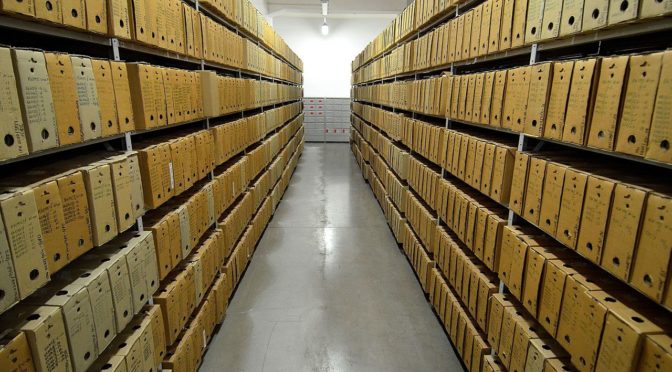
Historical policy-making in Poland and the political role of historians
Lecture by Valentin Behr (Warsaw University, The Robert Zajonc Institute for Social Studies and Centre for French Studies)
Where: CEFRES Library, Na Florenci 3, Prague 1
When: 28 March 2019, 2 pm
Organizers: CEFRES
Language: English
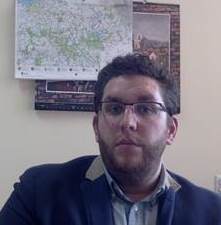
Abstract
This lecture will be dedicated to historical policy in Poland. I will first explain why I use the notion of “historical policy” and how it differs from the more common notion of “memory politics”. I will also illustrate my thesis by recalling the history and activities of the Polish Institute of National Remembrance (IPN), which is somehow similar to other institutions in postcommunist countries such as the German Gauck Institute or the Czech Institute for the Study of Totalitarian Regimes (USTR). Then, I will show how historical policy shapes some kind of official narrative about the past, by evoking some of the IPN’s publications. Finally, I will propose a more general reflection about the role and contribution of historians to the political uses of the past, by sketching a broader historical perspective, from the end of WWII onwards.
Lecture by Didier Fassin
Venue: Faculty of Arts of the Charles University, náměstí Jana Palacha, Prague 1, 2nd Floor, Room 200
Date: 31st October, 5 pm
Organizers: Institute of Ethnology (Faculty of Arts, Charles University) and CEFRES
Language: English
Didier Fassin, James D. Wolfensohn Professor of Social Science at the Institute for Advanced Study in Princeton, Director of Studies in Political and Moral Anthropology at the École des Hautes Études en Sciences Sociales in Paris, is an anthropologist and a sociologist who has conducted fieldwork in Senegal, Ecuador, South Africa, and France. Trained as a physician in internal medicine and public health, he dedicated his early research to medical anthropology, focusing on the AIDS epidemic and global health. He later developed the field of critical moral anthropology, which explores the historical, social, and political signification of moral forms involved in everyday judgment and action as well as in the making of national policies and international relations. He recently conducted an ethnography of the state, through a study of urban policing and the prison system. His current work is on the theory of punishment, the politics of life, and the public presence of the social sciences, which he presented for the Tanner Lectures, the Adorno Lectures, and at the Royal Swedish Academy of Sciences, respectively. He regularly contributes to newspapers and magazines. His recent books include Humanitarian Reason: A Moral History of the Present (2011), Enforcing Order: An Ethnography of Urban Policing (2013), At the Heart of the State: The Moral World of Institutions (2015), Prison Worlds: An Ethnography of the Carceral Condition (2016), The Will to Punish (2018), and Life: A Critical User’s Manual (2018).
The lecture is a part of “Ethnography and Theory” series organized by Institute of Ethnology, Faculty of Arts, Charles University
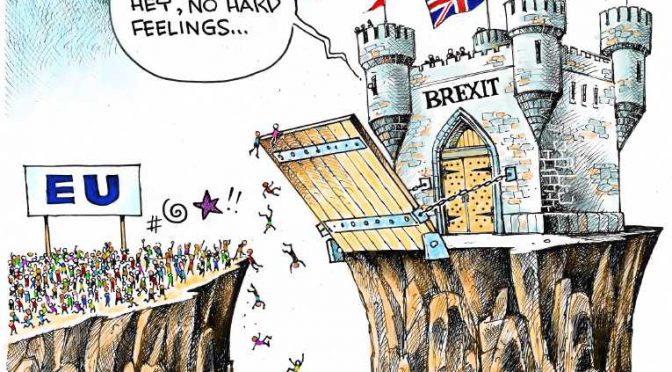
Normalizing Uncertainty. Tracing Brexit-Effects in the Lives of Slovak and Czech Roma Migrants in Britain (and Beyond)
A lecture by Jan Grill (University of Valle, Colombia)
Time & Venue: 5 pm, CEFRES Library (Na Florenci 3, Prague 1)
Organizer: CEFRES, Prague Forum for Romani Histories at the Institute of Contemporary History AV CR
Language: English
Abstract
This paper explores the effects of Brexit on the lives of Slovak and Czech Roma migrants in Great Britain through what can be called ‘normalizing uncertainty’. Coming alongside other East European migrants, some Roma networks started to move in search of more viable lives following the EU enlargement in 2004. Various studies have documented negative impacts the Brexit debates had on the lives of migrants, ranging from increased sense of uncertainty and rupture to the intensified modes of racialisation and xenophobic discrimination. Drawing on a long-term ethnographic research in the UK and in Slovakia, the present paper focuses not just on the level of discourses and narratives recorded in the aftermath of Brexit vote (elicited by researchers’ efforts and interviews) but rather tries to situate these within a long-term practices and relations vis-a-vis dominant societies and forms of being exposed to oppressive social forces and forms of violence and stigmatization. Drawing on relational sociological and anthropological perspectives, this paper examines different ways of coping with and responding to the pre/post-Brexit depending on social positions various migrants’ occupy within different social fields and the durable dispositions acquired against the backdrop of different modes of domination experienced in Central Eastern Europe and in Great Britain.
 Jan Grill is Assistant Professor of Sociology at the University of Valle, Colombia. He is also Research Associate at the Department of Social Anthropology at the University of Manchester. He has conducted extensive ethnographic research among Slovak, Czech, and Hungarian Roma/Gypsy groups, exploring issues related to different forms of migration from Central Eastern Europe to the United Kingdom and Canada. He has also carried out research on uneven mobilities in the city of Cali, Colombia. His central research interests are migration, ethnicity, racialization, marginality, labour, and the ethnography of the state. His recent publications include ‘Re‐learning to labour? ‘Activation Works’ and new politics of social assistance in the case of Slovak Roma’, Journal of Royal Anthropological Institute (2018); ‘“In England, they don’t call you black!” Migrating racialisations and the production of Roma difference across Europe’, Journal of Ethic and Migration Studies (2017); and ‘Struggles for the folk: politics of culture in Czechoslovak ethnography, 1940s-1950s’, History and Anthropology (2015).
Jan Grill is Assistant Professor of Sociology at the University of Valle, Colombia. He is also Research Associate at the Department of Social Anthropology at the University of Manchester. He has conducted extensive ethnographic research among Slovak, Czech, and Hungarian Roma/Gypsy groups, exploring issues related to different forms of migration from Central Eastern Europe to the United Kingdom and Canada. He has also carried out research on uneven mobilities in the city of Cali, Colombia. His central research interests are migration, ethnicity, racialization, marginality, labour, and the ethnography of the state. His recent publications include ‘Re‐learning to labour? ‘Activation Works’ and new politics of social assistance in the case of Slovak Roma’, Journal of Royal Anthropological Institute (2018); ‘“In England, they don’t call you black!” Migrating racialisations and the production of Roma difference across Europe’, Journal of Ethic and Migration Studies (2017); and ‘Struggles for the folk: politics of culture in Czechoslovak ethnography, 1940s-1950s’, History and Anthropology (2015).
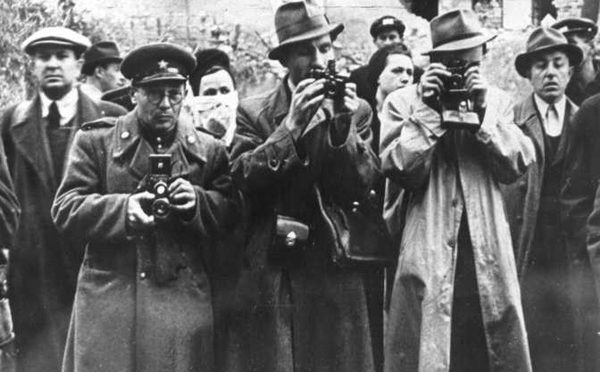
 Annette Wieviorka is probably one of the famous French historians on the Holocaust and a specialist of the history of Jews in France. A distinguished researcher of French National Research Center (CNRS), she just published 1945, la découverte (Le Seuil, 2017), dealing with the discovery of the Nazi concentration camps in April and May 1945 by the Allies through the testimonies of two war reporters. Among her books translated into English, one will read her groundbreaking The Era of the Witness (Cornell, 2006), along with Auschwitz Explained to My Child (Marlowe & Co, 2002). She talks about her personal trajectory in a series of interviews conducted by Séverine Nikel published in French under the title L’heure d’exactitude (2011). Annette Wieviorka will give her insight on the figure of the witness at the time of WWII during her lecture in Prague.
Annette Wieviorka is probably one of the famous French historians on the Holocaust and a specialist of the history of Jews in France. A distinguished researcher of French National Research Center (CNRS), she just published 1945, la découverte (Le Seuil, 2017), dealing with the discovery of the Nazi concentration camps in April and May 1945 by the Allies through the testimonies of two war reporters. Among her books translated into English, one will read her groundbreaking The Era of the Witness (Cornell, 2006), along with Auschwitz Explained to My Child (Marlowe & Co, 2002). She talks about her personal trajectory in a series of interviews conducted by Séverine Nikel published in French under the title L’heure d’exactitude (2011). Annette Wieviorka will give her insight on the figure of the witness at the time of WWII during her lecture in Prague.
Find out more about Annette Wieviorka here.
Venue: Faculty of Arts of the Charles University, Nám. J. Palacha, room 200
Horaires : 5:30-7:30
Organizers: Kateřina Čapková, Clara Royer and Milan Žonca
Partners: CEFRES, Prague Center for Jewish Studies (FF UK) and the Institute of Contemporary History of the Czech Academy of Sciences. With the support of the French Institute of Prague
Language: French with simultaneous translation in Czech
Illustration: “Taking photos of the victims in the ghetto (Budapest, 19. January 1945)”. Source: http://phdn.org/archives/holocaust-history.org/hungarian-photos/

Selling Souls: Trafficking German Migrants, Europe and America, 1648-1780
A lecture by William O’Reilly (Trinity Hall, University of Cambridge)
Time & Venue: 5:30 PM at CEFRES (Na Florenci 3, building C, 3rd floor – conference room)
Language: English
Organizer: Veronika Čapská (FHS UK)
 William O’Reilly is a senior lecturer in Early Modern History at the University of Cambridge, associate director at the Centre for History and Economics and full-time fellow at the Institute for Advanced Study in Budapest. He has worked on a range of topics in early modern European and Atlantic history, and is particularly interested in the history of European migration, colonialism and imperialism. He serves on the International Advisory Boards of the Historical Journal and Themes in Migrations.
William O’Reilly is a senior lecturer in Early Modern History at the University of Cambridge, associate director at the Centre for History and Economics and full-time fellow at the Institute for Advanced Study in Budapest. He has worked on a range of topics in early modern European and Atlantic history, and is particularly interested in the history of European migration, colonialism and imperialism. He serves on the International Advisory Boards of the Historical Journal and Themes in Migrations.
Abstract:
Selling Souls investigates the history of seventeenth and eighteenth-century German emigration to North America and Central and Eastern Europe through the actions of Seelenverkäufer, the ‘soul-selling’ traffickers who recruited and escorted migrants and who bridged divides in geography, in literacy and illiteracy, in economic security and insecurity, in freedom and servitude. As the fashion for emigration grew in Europe after the great depopulation and general upheavals of the Thirty Years’ War, so did the proclivity of recruiters. It was virtually impossible in seventeenth and eighteenth-century Europe to contemplate emigration without coming under the influence of an agent or advertiser. They were scoundrels and saviours in differing measure and without their actions the entire process of early-modern migration would have been inconceivable. As such, they laid the groundwork for subsequent mass migration in the nineteenth and twentieth centuries.
Selling Souls considers the role of colonist recruiters in the creation of a complex network of communication that encompassed an expansive Atlantic World, from Pennsylvania to Transylvania. Without the actions of migrant recruiters, informal webs of contact and communication could not have been maintained among migrants and, by extension, further migration might not have taken place.
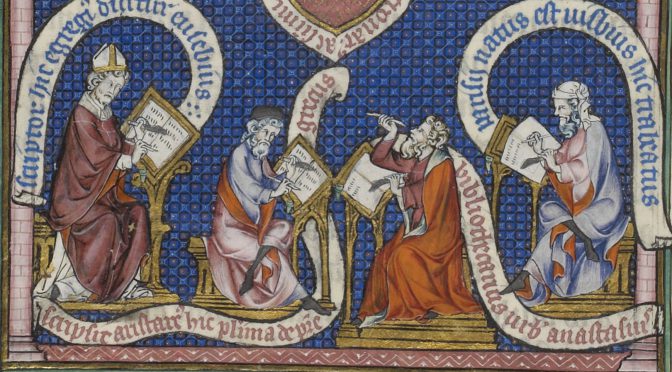
Transfer, Translation and Transmission of Knowledge in Monastic Networks. Research Directions and Approaches in the Study of Medieval and Early Modern Patterns
A keynote speech by József Laszlovszky (Department of Medieval Studies, Central European University, Budapest)
Time & Venue: 5:30 PM at Špork Palace, Hybernská 3, Prague 1, room nr. 303
Language: English
 József Laszlovszky is a full time professor of the Department of Medieval Studies at the Central European University and a guest lecturer at the Department of Medieval and Postmedieval Archaeology at the Eötvös Loránd University. His research fields cover archaeology, archaeozoology, material culture and everyday life with a strong focus on ecclesiastical, urban and enomic history. He is the director of the Cultural Heritage Studies Program at CEU.
József Laszlovszky is a full time professor of the Department of Medieval Studies at the Central European University and a guest lecturer at the Department of Medieval and Postmedieval Archaeology at the Eötvös Loránd University. His research fields cover archaeology, archaeozoology, material culture and everyday life with a strong focus on ecclesiastical, urban and enomic history. He is the director of the Cultural Heritage Studies Program at CEU.
Abstract
Interactions and exchanges (spiritual and material) between monastic communities have been discussed in monastic studies for a very long period of time: to some extent the history of monastic culture and the issue of mission by monastic groups cover all related research questions in this context. Textual and church historical research of monastic rules, the movement and travels of leading monastic figures, the history of pilgrimages, the transmission of texts between monastic scriptoria, and the study of monastic libraries were typical research directions in these previous studies. More recently, the concept of knowledge transfer was introduced as a holistic approach and more emphasis has been given to the problem of communication. The question is not only about the object of the knowledge transfer, but more about the ways and means of interactions between the monastic communities.
By using the results of a joint research project carried out by the FOVOG (Research Centre for the Comparative History of Religious Orders) in Dresden and the Department of Medieval Studies at CEU (Budapest) during the last some years this paper offers an overview of the new research directions in monastic studies. It will discuss the key concepts of these studies, such as the transmission of ideas, objects and complex knowledge packages in monastic circles. These examples allow us to understand better the general problem of monastic life. The combination of a written regula and of a set of unwritten rules and practices is the key factor in establishing a new monastic community. Research results will be presented on the issue of monastic architecture, technological innovations and of „monastic business management”. Recent studies in the field of such questions in the medieval and early modern period have already demonstrated that the traditional boundaries between the different monastic orders should not be taken as clear cut division lines and more interaction can be detected in this respect. By introducing new research concepts into these fields of studies, such as the concept of monastic landscape, a more global (international) research direction can be developed. At the same time, local aspects and influences can also be taken into consideration, and for these the issue of siting or site selection in the process of a new monastic foundations play a crucial role.
Instead of a panoramic and general overview of all these questions, the paper will offer case-studies to highlight different research approaches and concepts, particularly in the context of material evidence for knowledge transfer and transmission of ideas.










